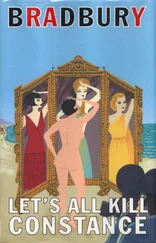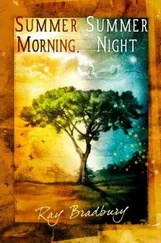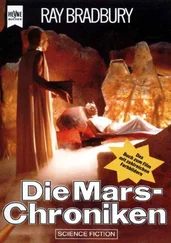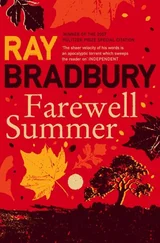Ray Bradbury - All Summer in a Day
Здесь есть возможность читать онлайн «Ray Bradbury - All Summer in a Day» весь текст электронной книги совершенно бесплатно (целиком полную версию без сокращений). В некоторых случаях можно слушать аудио, скачать через торрент в формате fb2 и присутствует краткое содержание. Жанр: Фантастика и фэнтези, на английском языке. Описание произведения, (предисловие) а так же отзывы посетителей доступны на портале библиотеки ЛибКат.
- Название:All Summer in a Day
- Автор:
- Жанр:
- Год:неизвестен
- ISBN:нет данных
- Рейтинг книги:4 / 5. Голосов: 1
-
Избранное:Добавить в избранное
- Отзывы:
-
Ваша оценка:
- 80
- 1
- 2
- 3
- 4
- 5
All Summer in a Day: краткое содержание, описание и аннотация
Предлагаем к чтению аннотацию, описание, краткое содержание или предисловие (зависит от того, что написал сам автор книги «All Summer in a Day»). Если вы не нашли необходимую информацию о книге — напишите в комментариях, мы постараемся отыскать её.
All Summer in a Day — читать онлайн бесплатно полную книгу (весь текст) целиком
Ниже представлен текст книги, разбитый по страницам. Система сохранения места последней прочитанной страницы, позволяет с удобством читать онлайн бесплатно книгу «All Summer in a Day», без необходимости каждый раз заново искать на чём Вы остановились. Поставьте закладку, и сможете в любой момент перейти на страницу, на которой закончили чтение.
Интервал:
Закладка:
All Summer in a Day
by Ray Bradbury
"Ready?"
"Ready."
"Now?"
"Soon."
"Do the scientists really know? Will it happen today, will it?"
"Look, look; see for yourself!"
The children pressed to each other like so many roses, so many weeds, intermixed, peering out for a look at the hidden sun.
It rained.
It had been raining for seven years; thousands upon thousands of days compounded and filled from one end to the other with rain, with the drum and gush of water, with the sweet crystal fall of showers and the concussion of storms so heavy they were tidal waves come over the islands. A thousand forests had been crushed under the rain and grown up a thousand times to be crushed again. And this was the way life was forever on the planet Venus, and this was the school room of the children of the rocket men and women who had come to a raining world to set up civilization and live out their lives.
"It's stopping, it's stopping!"
"Yes, yes!"
Margot stood apart from them, from these children who could ever remember a time when there wasn't rain and rain and rain. They were all nine years old, and if there had been a day, seven years ago, when the sun came out for an hour and showed its face to the stunned world, they could not recall. Sometimes, at night, she heard them stir, in remembrance, and she knew they were dreaming and remembering gold or a yellow crayon or a coin large enough to buy the world with. She knew they thought they remembered a warmness, like a blushing in the face, in the body, in the arms and legs and trembling hands. But then they always awoke to the tatting drum, the endless shaking down of clear bead necklaces upon the roof, the walk, the gardens, the forests, and their dreams were gone.
All day yesterday they had read in class about the sun. About how like a lemon it was, and how hot. And they had written small stories or essays or poems about it:
I think the sun is a flower,
That blooms for just one hour.
That was Margot's poem, read in a quiet voice in the still classroom while the rain was falling outside.
"Aw, you didn't write that!" protested one of the boys.
"I did," said Margot. "I did."
"William!" said the teacher.
But that was yesterday. Now the rain was slackening, and the children were crushed in the great thick windows.
Where's teacher?"
"She'll be back."
"She'd better hurry, we'll miss it!"
They turned on themselves, like a feverish wheel, all tumbling spokes. Margot stood alone. She was a very frail girl who looked as if she had been lost in the rain for years and the rain had washed out the blue from her eyes and the red from her mouth and the yellow from her hair. She was an old photograph dusted from an album, whitened away, and if she spoke at all her voice would be a ghost. Now she stood, separate, staring at the rain and the loud wet world beyond the huge glass.
"What're you looking at?" said William.
Margot said nothing.
"Speak when you're spoken to."
He gave her a shove. But she did not move; rather she let herself be moved only by him and nothing else. They edged away from her, they would not look at her. She felt them go away. And this was because she would play no games with them in the echoing tunnels of the underground city. If they tagged her and ran, she stood blinking after them and did not follow. When the class sang songs about happiness and life and games her lips barely moved. Only when they sang about the sun and the summer did her lips move as she watched the drenched windows. And then, of course, the biggest crime of all was that she had come here only five years ago from Earth, and she remembered the sun and the way the sun was and the sky was when she was four in Ohio. And they, they had been on Venus all their lives, and they had been only two years old when last the sun came out and had long since forgotten the color and heat of it and the way it really was.
But Margot remembered.
"It's like a penny," she said once, eyes closed.
"No it's not!" the children cried.
"It's like a fire," she said, "in the stove."
"You're lying, you don't remember!" cried the children.
But she remembered and stood quietly apart from all of them and watched the patterning windows. And once, a month ago, she had refused to shower in the school shower rooms, had clutched her hands to her ears and over her head, screaming the water mustn't touch her head. So after that, dimly, dimly, she sensed it, she was different and they knew her difference and kept away. There was talk that her father and mother were taking her back to Earth next year; it seemed vital to her that they do so, though it would mean the loss of thousands of dollars to her family. And so, the children hated her for all these reasons of big and little consequence. They hated her pale snow face, her waiting silence, her thinness, and her possible future.
"Get away!" The boy gave her another push. "What're you waiting for?"
Then, for the first time, she turned and looked at him. And what she was waiting for was in her eyes.
"Well, don't wait around here!" cried the boy savagely. "You won't see nothing!"
Her lips moved.
"Nothing!" he cried. "It was all a joke, wasn't it?" He turned to the other children. "Nothing's happening today. Is it?"
They all blinked at him and then, understanding, laughed and shook their heads.
"Nothing, nothing!"
"Oh, but," Margot whispered, her eyes helpless. "But this is the day, the scientists predict, they say, they know , the sun…"
"All a joke!" said the boy, and seized her roughly. "Hey, everyone, let's put her in a closet before the teacher comes!"
"No," said Margot, falling back.
They surged about her, caught her up and bore her, protesting, and then pleading, and then crying, back into a tunnel, a room, a closet, where they slammed and locked the door. They stood looking at the door and saw it tremble from her beating and throwing herself against it. They heard her muffled cries. Then, smiling, the turned and went out and back down the tunnel, just as the teacher arrived.
"Ready, children?" She glanced at her watch.
"Yes!" said everyone.
"Are we all here?"
"Yes!"
The rain slacked still more.
They crowded to the huge door.
The rain stopped.
It was as if, in the midst of a film concerning an avalanche, a tornado, a hurricane, a volcanic eruption, something had, first, gone wrong with the sound apparatus, thus muffling and finally cutting off all noise, all of the blasts and repercussions and thunders, and then, second, ripped the film from the projector and inserted in its place a beautiful tropical slide which did not move or tremor. The world ground to a standstill. The silence was so immense and unbelievable that you felt your ears had been stuffed or you had lost your hearing altogether. The children put their hands to their ears. They stood apart. The door slid back and the smell of the silent, waiting world came in to them.
The sun came out.
It was the color of flaming bronze and it was very large. And the sky around it was a blazing blue tile color. And the jungle burned with sunlight as the children, released from their spell, rushed out, yelling into the springtime.
"Now, don't go too far," called the teacher after them. "You've only two hours, you know. You wouldn't want to get caught out!"
But they were running and turning their faces up to the sky and feeling the sun on their cheeks like a warm iron; they were taking off their jackets and letting the sun burn their arms.
"Oh, it's better than the sun lamps, isn't it?"
"Much, much better!"
They stopped running and stood in the great jungle that covered Venus, that grew and never stopped growing, tumultuously, even as you watched it. It was a nest of octopi, clustering up great arms of fleshlike weed, wavering, flowering in this brief spring. It was the color of rubber and ash, this jungle, from the many years without sun. It was the color of stones and white cheeses and ink, and it was the color of the moon.
Читать дальшеИнтервал:
Закладка:
Похожие книги на «All Summer in a Day»
Представляем Вашему вниманию похожие книги на «All Summer in a Day» списком для выбора. Мы отобрали схожую по названию и смыслу литературу в надежде предоставить читателям больше вариантов отыскать новые, интересные, ещё непрочитанные произведения.
Обсуждение, отзывы о книге «All Summer in a Day» и просто собственные мнения читателей. Оставьте ваши комментарии, напишите, что Вы думаете о произведении, его смысле или главных героях. Укажите что конкретно понравилось, а что нет, и почему Вы так считаете.









